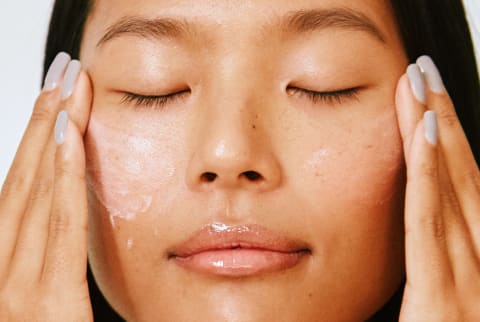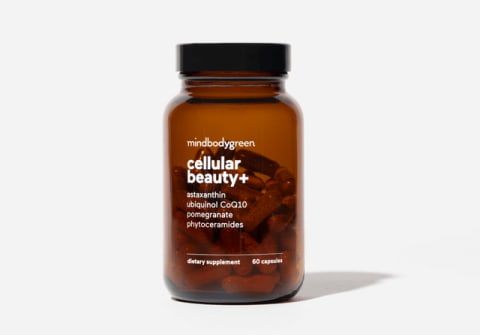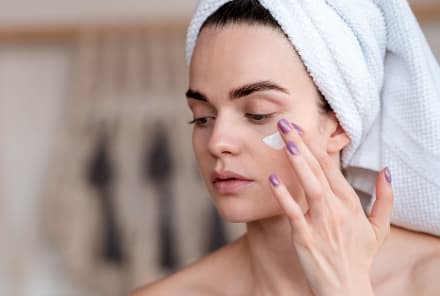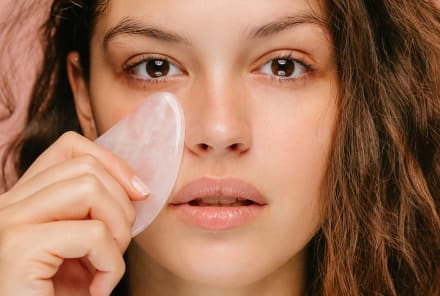Advertisement
Central Heating Can Leave Skin Dry & Dull — Here Are 5 Must-Know Tips

Hannah Frye is the Assistant Beauty Editor at mindbodygreen. She has a B.S. in journalism and a minor in women’s, gender, and queer studies from California Polytechnic State University, San Luis Obispo. Hannah has written across lifestyle sections including health, wellness, sustainability, personal development, and more.

When winter rolls around, it's only natural to crank up the heat. While this may make you feel cozy at first, your skin will likely beg to differ. Why? Well, central heating dries out the air. This is why you might wake up with irritated skin, dry nostrils, or chapped lips, as the arid air robs your skin of moisture.
Now, this doesn't mean you have to abandon your heaters to keep your skin dewy all winter long. Instead, follow these tips:
Get a humidifier.
"Low humidity, cold air, brisk winds, [and] dry indoor heating are all factors that can increase moisture loss from the skin and increase risk of dry skin," board-certified dermatologist Hadley King, M.D., tells mbg.
In order to combat that moisture loss in the air, add a humidifier to your bedroom, living room, desk area, or wherever else you spend most of your time. Here are seven desktop humidifiers that will get the job done without taking up too much space.
Invest in skin supplements for wintertime.
There's a long list of supplements that can help ease dry skin year-round, but you might want to think about adding an extra layer of support during wintertime, even if you don't typically have dry skin.* The most notable include those with phytoceramides and antioxidants, as well as hyaluronic acid.
However, not all skin supplements are formulated with research-backed, trusted ingredients—here are 13 expert-approved products to ease your search.
Use an occlusive moisturizer.
Using a highly occlusive moisturizer over your regular moisturizer (a technique commonly referred to as slugging) is an A+ method for preserving skin moisture in the wintertime. Simply layer on your go-to face lotion or cream and follow up with an occlusive oil.
Some people opt for petrolatum-based products and ointments, but we're not huge fans of these mineral oil products at mbg due to their environmental impact—you can read more about that here. Instead, botanical oils like squalane, jojoba, marula, rosehip, algae, etc., will do the job. Here's a list of our top 13 face oils, if you want to shop now.
Focus on internal hydration.
While you might focus on hydration during summer to compensate for sweat, wintertime deserves just as much attention. When your skin lacks water, it's more likely to become irritated and, therefore, lack radiance.
Luckily, this is a fixable situation: Up your water intake and add ingredients like hyaluronic acid supplements to your smoothies for an added boost. This is also another reason to prioritize skin-hydrating beauty supplements (like ones that include phytoceramides) if you need an extra nudge.*
Minimize drying products.
Your skin barrier can easily weaken during the winter (again, because of that arid, dry air), which means you should be extra careful when it comes to potentially drying topicals—think clay face masks, astringents, witch hazel, tea tree, etc. Instead, focus on hydrating and soothing products that nourish your skin microbiome; find our favorites here.
The takeaway.
Central heating can dry out your skin if you don't take proper precautions and compensate for the lack of humidity. Do your best to stick with hydrating products, use an occlusive oil at night, and always prioritize skin hydration from the inside out. Want more tips for dry, wintry skin? Check these out.
Watch Next
Enjoy some of our favorite clips from classes
Enjoy some of our favorite clips from classes
What Is Meditation?
Mindfulness/Spirituality | Light Watkins
Box Breathing
Mindfulness/Spirituality | Gwen Dittmar
What Breathwork Can Address
Mindfulness/Spirituality | Gwen Dittmar
The 8 Limbs of Yoga - What is Asana?
Yoga | Caley Alyssa
Two Standing Postures to Open Up Tight Hips
Yoga | Caley Alyssa
How Plants Can Optimize Athletic Performance
Nutrition | Rich Roll
What to Eat Before a Workout
Nutrition | Rich Roll
How Ayurveda Helps Us Navigate Modern Life
Nutrition | Sahara Rose
Messages About Love & Relationships
Love & Relationships | Esther Perel
Love Languages
Love & Relationships | Esther Perel


















